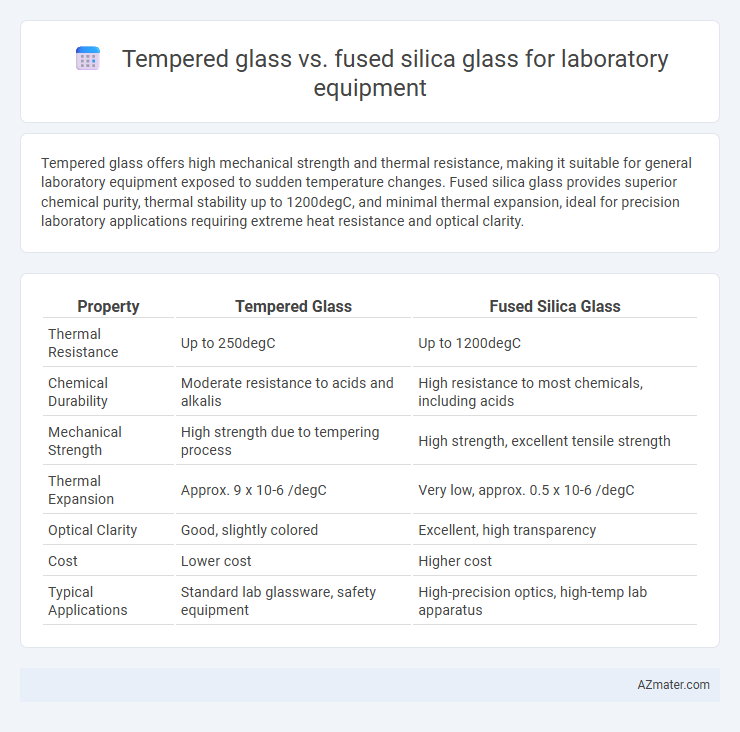Tempered glass offers high mechanical strength and thermal resistance, making it suitable for general laboratory equipment exposed to sudden temperature changes. Fused silica glass provides superior chemical purity, thermal stability up to 1200degC, and minimal thermal expansion, ideal for precision laboratory applications requiring extreme heat resistance and optical clarity.
Table of Comparison
| Property | Tempered Glass | Fused Silica Glass |
|---|---|---|
| Thermal Resistance | Up to 250degC | Up to 1200degC |
| Chemical Durability | Moderate resistance to acids and alkalis | High resistance to most chemicals, including acids |
| Mechanical Strength | High strength due to tempering process | High strength, excellent tensile strength |
| Thermal Expansion | Approx. 9 x 10-6 /degC | Very low, approx. 0.5 x 10-6 /degC |
| Optical Clarity | Good, slightly colored | Excellent, high transparency |
| Cost | Lower cost | Higher cost |
| Typical Applications | Standard lab glassware, safety equipment | High-precision optics, high-temp lab apparatus |
Introduction to Laboratory Glass Materials
Tempered glass offers enhanced mechanical strength and thermal resistance, making it suitable for standard laboratory equipment subjected to moderate thermal stress. Fused silica glass, with its exceptional chemical purity and superior resistance to thermal shock up to 1200degC, is preferred for high-precision applications requiring maximum optical clarity and minimal thermal expansion. Selecting between tempered glass and fused silica depends on the specific laboratory use, balancing durability, temperature tolerance, and chemical inertness.
Overview of Tempered Glass
Tempered glass used in laboratory equipment offers enhanced strength and thermal resistance due to its controlled heat treatment process, making it less prone to breakage under stress. It provides safety benefits as it shatters into small, less harmful pieces compared to regular glass, which is crucial for lab environments. Although tempered glass is robust, it has limitations in chemical resistance compared to fused silica glass, which excels in high thermal stability and chemical inertness.
Overview of Fused Silica Glass
Fused silica glass is a high-purity, non-crystalline form of silicon dioxide known for its exceptional thermal stability, chemical resistance, and optical clarity, making it ideal for demanding laboratory applications. Unlike tempered glass, fused silica exhibits superior resistance to thermal shock and can withstand extreme temperature fluctuations without cracking or deforming. Its low thermal expansion coefficient and high UV transmission capacity enhance precision and durability in sensitive laboratory experiments and instrumentation.
Thermal Resistance Comparison
Tempered glass offers moderate thermal resistance with a temperature range up to approximately 250degC, making it suitable for general laboratory applications requiring durability and impact resistance. Fused silica glass exhibits superior thermal resistance, tolerating temperatures beyond 1000degC with minimal thermal expansion and exceptional resistance to thermal shock, ideal for high-temperature and precision laboratory processes. The choice between tempered glass and fused silica glass depends on the specific thermal demands of the laboratory environment and the required performance under rapid temperature changes.
Chemical Durability and Compatibility
Tempered glass offers good mechanical strength but has moderate chemical durability, making it susceptible to attack by strong alkalis and hydrofluoric acid. Fused silica glass exhibits exceptional chemical resistance and compatibility, resisting most acids, alkalis, and solvents due to its high purity and amorphous silica structure. Laboratories requiring highly resistant glassware for aggressive chemical reactions often prefer fused silica for its superior durability and inertness.
Mechanical Strength and Impact Resistance
Tempered glass offers superior mechanical strength and enhanced impact resistance compared to standard glass, making it ideal for laboratory equipment that must withstand sudden temperature changes and physical stresses. Fused silica glass excels in thermal shock resistance and chemical inertness but generally has lower mechanical strength and impact resistance than tempered glass. Laboratories requiring durable, impact-resistant apparatus often prefer tempered glass, whereas fused silica is chosen for applications needing high thermal stability and purity.
Optical Clarity and Transmission
Tempered glass offers high durability but has lower optical clarity and visible light transmission compared to fused silica glass, which exhibits superior transparency and minimal light distortion essential for precise laboratory measurements. Fused silica glass maintains excellent transmission across a broader UV to IR spectrum, making it ideal for applications requiring accurate spectral analysis. Optical clarity in fused silica reduces signal loss and enhances the accuracy of instruments such as spectrophotometers and microscopes, outperforming tempered glass in performance-critical laboratory settings.
Cost and Availability for Laboratories
Tempered glass offers lower initial costs and greater availability for laboratory equipment, making it a common choice for budget-conscious labs. Fused silica glass, while more expensive due to its superior thermal and chemical resistance, provides enhanced durability and optical clarity in demanding applications. Laboratories prioritize tempered glass when cost and accessibility are critical, whereas fused silica is preferred for high-precision tasks despite its higher investment.
Typical Laboratory Applications
Tempered glass is commonly used for laboratory equipment requiring high mechanical strength and resistance to thermal shock, such as safety shields, containers, and glassware for heating and cooling cycles. Fused silica glass is preferred in applications demanding exceptional chemical purity, UV transparency, and high thermal stability, including spectrophotometry cuvettes, high-precision optics, and semiconductor processing components. The choice between tempered glass and fused silica glass depends on the specific laboratory requirements for durability, optical clarity, and chemical inertness.
Choosing the Right Glass for Your Laboratory
Tempered glass offers superior mechanical strength and thermal resistance, making it suitable for laboratory equipment subjected to rapid temperature changes and physical impacts. Fused silica glass provides exceptional chemical durability and a high melting point, ideal for experiments involving corrosive substances and extreme heat. Selecting the right glass depends on the specific laboratory application, balancing factors like thermal shock resistance, chemical inertness, and mechanical durability.

Infographic: Tempered glass vs Fused silica glass for Laboratory equipment
 azmater.com
azmater.com